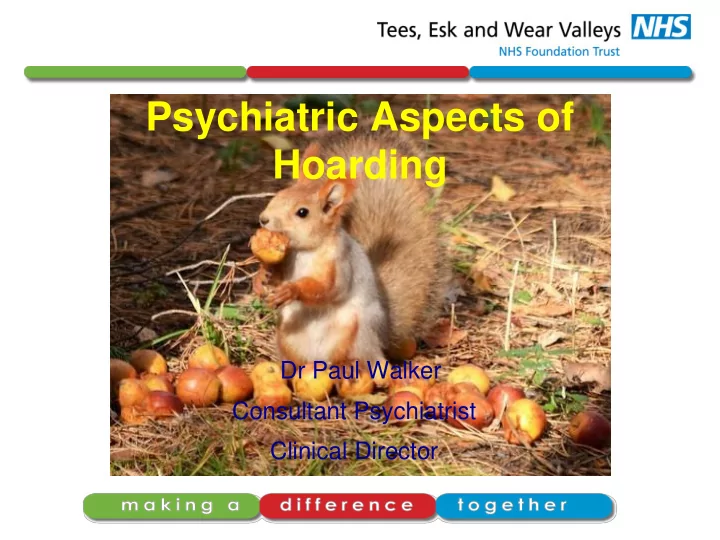

Psychiatric Aspects of Hoarding Dr Paul Walker Consultant Psychiatrist Clinical Director
DSM-5 A New Category APA- Since May 2013 Still not in ICD 10 No longer Subcategory of OCD Incidence 1-5% of population? V little research – this will help
Hoarding Disorder:DSM 5 A . Persistent difficulty discarding or parting with personal possessions, even those of apparently useless or limited value, due to strong urges to save items, distress, and/or indecision associated with discarding. B . The symptoms result in the accumulation of a large number of possessions that fill up and clutter the active living areas of the home, workplace, or other personal surroundings (e.g., office, vehicle, yard) and prevent normal use of the space. If all living areas are uncluttered, it is only because of others’ efforts (e.g., family members, authorities) to keep these areas free of possessions. C . The symptoms cause clinically significant distress or impairment in social, occupational, or other important areas of functioning (including maintaining a safe environment for self and others). D . The hoarding symptoms are not due to a general medical condition (e.g., brain injury, cerebrovascular disease). E . The hoarding symptoms are not restricted to the symptoms of another mental disorder (e.g., hoarding due to obsessions in Obsessive-Compulsive Disorder, lack of motivation in Major Depressive Disorder, delusions in Schizophrenia or another Psychotic Disorder, cognitive deficits in Dementia, restricted interests in Autistic Disorder, food storing in Prader-Willi Syndrome).
Obsessive Compulsive Disorder Hoarding was subcategory- not now OCD is: 1) Orderly and tidy (initially) 2) Symmetrical, labelled , alphabetical, collections 3) Recognised as excessive 4) Resisted 5) Uncomfortable initially then comforting. Treatable – CBT, SSRIs. 6) ( but very variable, above is the ‘textbook’ case! )
Which Mental illness to look for? Any! Predisposing/ precipitating/ perpetuating Depression ‘Abnormal’ bereavement Anxiety/ social phobia Alcohol abuse/ Korsakoffs Psychosis/ Paranoia Dementia Autism Spectrum Disorder
Depression and anxiety Usually occur together Anxiety often most disabling Emotional paralysis Shutting out the world Engineering isolation Reinforcing core negative beliefs
Bipolar Disorder Remember mainly depressive disorder Hypomanic/ manic states- XS spending Often expensive items, clothes, shoes, new car etc Redecorating, colourful or garish, designer May then feel shame and avoid taking back Unlikely to hoard worthless things
Substance misuse (esp alcohol) Empty bottles/ cans everywhere (may be hidden) Smell of alcohol/ breath/ slurred speech Poor balance/ coordination/ falls Thin/ poor nutrition Self neglect Memory problems Long history of downward life spiral Poverty
Dementia Increases with age Progressive global decline (cognition/ functioning) Gross disorientation, maybe confabulation (‘It’s 1974’) Self neglect/ poor nutrition Incontinence Short term memory loss Risks – leaving gas on/ electric fire etc, smoking Alzheimers/ vascular/ lewy body Multiple physical problems/ mobility etc
Autism Spectrum Disorder Huge increase in recognition National Autism Strategy Often previously missed as ‘eccentric/ odd/ loners’ Maybe family history Generally function ok until other problem Need developmental history Look for poor eye contact, never fitted in, happy loners May have learning disability
Psychosis Chronic positive then negative symptoms Paranoia about the world or isolated delusions Social exclusion- no job/ money/ friends Misinterpret concern from neighbours/ LA as ‘persecution’ Very likely to have poor physical health/ diet May be instructed by hallucinations Modern ‘recovery’ approach -PSI
Bereavement Efforts to ‘freeze time’ by bereaved Shrine may precipitate storing behaviour May unmask previously balanced habits/ personality Throwing stuff out seen as loss Moving on seen as disrespectful to loved one May need to move house
Medication Nothing specific/ licenced for Hoarding Treat concurrent disorders if appropriate Antidepressants Antipsychotics Major issues with meds concordance Poor insight / resistance/ suspicion Crisis team /assertive outreach team?
Resources http://www.ocfoundation.org/hoarding/fact_sheet.aspx http://www.rcpsych.ac.uk/healthadvice.aspx
Recommend
More recommend